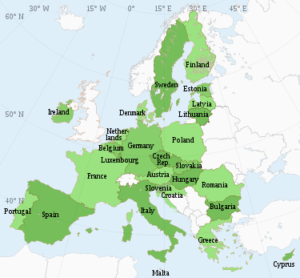What is the European Court of Justice?
The European Court of Justice (ECJ) is the highest level court in the European Union, equivalent to the United States Supreme Court. The ECJ is tasked with translating EU law and applying it across all EU member states.
What is the GDPR?
The General Data Protection Regulation (GDPR) is a law that applies to the European Union and was implemented to provide data protection and privacy. It also applies to personal data that is sent outside the EU and EEA areas.
How Does the GDPR Rule Affect EU Residents?
 You may have noticed that many web pages now display a warning that cookies will be created on the website that you are visiting and you need to acknowledge that you accept this option. It does not have to be visitors just from the EU, but anyone who visits your web page.
You may have noticed that many web pages now display a warning that cookies will be created on the website that you are visiting and you need to acknowledge that you accept this option. It does not have to be visitors just from the EU, but anyone who visits your web page.
This rule, in particular, applies to Facebook business pages, called fan pages, and advises that any information the Facebook user enters can be saved in the cookies for later use by the FB administrator. If further declares that the administrator can be held personally accountable for the “freeflow” of their information to and from and on your page.
What are Cookies?
Cookies are used all over the world wide web, including Facebook and almost every other social network mainly for advertising and promotion purposes “to … enable the fan page administrator to obtain statistics produced … from the visits to the page, — so that it can offer them more relevant content and develop functionalities likely to be of more interest to them.”
What is a Corporate Fan Page?
The official definition of a corporate fan page is the following: “user accounts that can be set up on Facebook by individuals or businesses…[T]he author of the fan page … can use the … Facebook [platform] to introduce himself to … persons visiting the fan page.”
Conclusion
With the data protection law in effect, it is prudent that web designers, content managers, administrators, and their respective clients be vigilant about the consequences when personal information is entered on a website that they are administrating.

